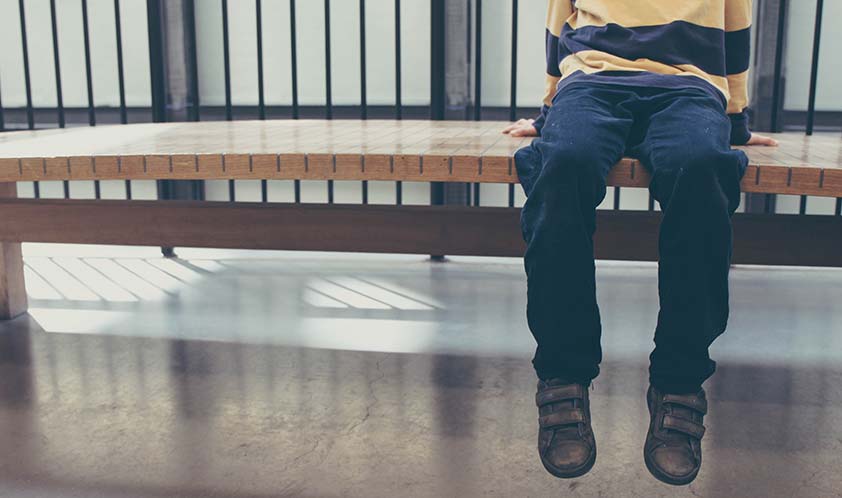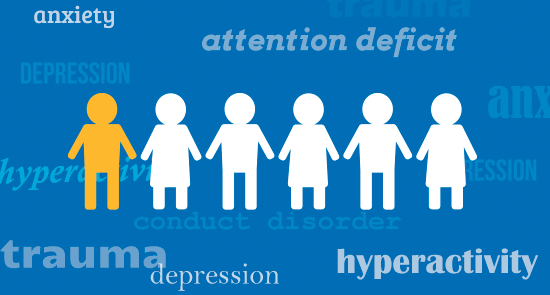
The Carter Center Mental Health Program, in partnership with Georgia Appleseed Center for Law and Justice and Voices for Georgia’s Children, is leading a collaborative of state agencies, advocacy organizations, academic institutions, local and community leaders, and philanthropic foundations in a strategic and collective effort to strengthen, expand, and sustain school-based behavioral health, prevention, early intervention, and services and supports in the state of Georgia. The vision for the work is that School-Based Behavioral Health (SBBH) will be as common in Georgia's schools as the provision of school lunch and that Georgia will be the preeminent state in SBBH. The goal of this initiative is to optimize limited resources, decrease fragmentation, and expand the work currently being conducted so that all of Georgia’s children have the opportunity to benefit from SBBH.
Background

One out of every six U.S. children aged 2–8 years (17.4%) has a diagnosed mental, behavioral, or developmental disorder.[1] If left untreated, mental health issues can lead to higher rates of truancy, impaired academic performance, and the development of behavioral issues inside and outside of the classroom.[2] Too often, school staff lack mental health support services, and without them, children suffering from serious trauma, depression, anxiety, conduct disorders, and/or attention deficit disorder are not identified and provided the assistance and supports they need. Instead, they receive disciplinary measures that frequently make the situation worse. Current solutions include moving students to segregated alternative schools and/or to increasingly restricted environments, too often resulting in students ultimately encountering the juvenile justice system. As a state, Georgia has declared that these solutions are inadequate and unacceptable, and reform has started to occur, with the assistance of state and federal funds, as well as the interest and investment from philanthropic foundations. An effort is needed that pulls together the significant amount of expert time and resources being expended both in the public and private sectors aimed at improving access to behavioral health through schools and that will ultimately benefit children who are insured both privately and publicly.
[1] Cree RA, Bitsko RH, Robinson LR, et al. Health Care, Family, and Community Factors Associated with Mental, Behavioral, and Developmental Disorders and Poverty Among Children Aged 2–8 Years — United States, 2016. MMWR Morb Mortal Wkly Rep 2018;67:1377–1383. DOI: http://dx.doi.org/10.15585/mmwr.mm6750a1
[2] The Illinois Children's Mental Health Partnership, School Based Mental Health in Illinois: Assessing the Present and Looking Toward the Future, C. Lueck, Editor. 2010
Current Landscape
Georgia has piloted robust, promising SBBH models. The Georgia Apex Program, administered through the Department of Behavioral Health and Developmental Disabilities, began in 2015 and increases the provision of school-based mental health services in various regions of the state by supporting early detection of mental health needs and establishing better coordination between school districts and the state’s community service boards, which serve as the safety net behavioral health providers for the state. The Carter Center Mental Health Program (MHP) has taken initial steps to affect system change by convening a group of key leaders and stakeholders with the intent to coordinate activity and build upon the current work of those stakeholders.
Find research findings, data, and reports in this digital library »
See presentations and videos from regional forums convened around the state in collaboration with local school systems, community service boards, parents and experts »
Please sign up below for important news about the work of The Carter Center and special event invitations.
View past press releases, agendas, and presentation slides »
![]()
2018-19 Carter fellow Christine Herman explores How Schools Can Help Kids Heal after a Year of 'Crisis and Uncertainty' for NPR (April 2021). In her reporting, Herman covers ways to help children to express losses and fears by promoting wellness in the classroom through social-emotional exercises, as well as promoting virtual counseling for both parents and their children.